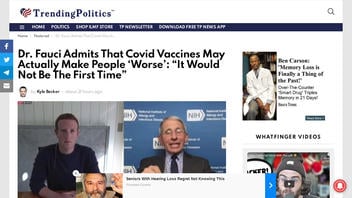
Did Dr. Anthony Fauci admit that COVID-19 vaccines may make people worse? No, that's not true: His comments were taken out of context. He spoke in March 2020, when the vaccines were still in development. The nation's top infectious disease expert was talking about a concern that some scientists had at that time: the theoretical possibility, with any vaccine candidates, that it will be one of a very few new vaccine candidates that turn out to make an infection worse. To date, there is no publicly available evidence suggesting the COVID-19 vaccines do that. Fauci regularly has spoken in the 20 months following that video interview about the benefits of the vaccine.
The claim appeared in an article (archived here) published by Trending Politics on December 14, 2021. Titled "Dr. Fauci Admits That Covid Vaccines May Actually Make People 'Worse': 'It Would Not Be The First Time,'" the article opened:
Dr. Anthony Fauci sat down with "Meta" CEO Mark Zuckerberg and finally said out loud what many people have been warning for over a year about the rushed mRNA vaccines: They may actually make the Covid pandemic worse.
Users on social media saw this title, description and thumbnail:
Dr. Fauci Admits That Covid Vaccines May Actually Make People 'Worse': "It Would Not Be The First Time"
Dr. Anthony Fauci sat down with "Meta" CEO Mark Zuckerberg and finally said out loud what many people have been warning for [...] More
The article continued:
Dr. Fauci was commenting on a recent study that showed that the Covid vaccines may actually make a recipient more likely to be reinfected than someone with natural immunity from a prior infection.
That's not true. Fauci's conversation with Zuckerberg took place in March 2020, not December 2021. Fauci was responding to a question that Zuckerberg asked about why a vaccine wouldn't be rolled out, once proven safe, even if its effectiveness was not 100% clear. Here's how Fauci responded:
Okay, that's a good question. The initial safety study, Mark, is to see, if I inject it in the arm, does it have some sort of idiosyncratic or bad reaction? There's another element to safety, and that is, if you vaccinate someone and they make an antibody response, and then they get exposed and infected, does the response that you induced actually enhance the infection and make it worse? And the only way you'll know that is if you do an extended study -- not in a normal volunteer who has no risk of infection, but in people who are out there in a risk situation.
This would not be the first time, if it happened, that a vaccine that looked good in initial safety actually made people worse. There was the history of the respiratory syncytial virus vaccine in children which, paradoxically, made the children worse. One of the HIV vaccines that we tested several years ago actually made individuals more likely to get infected. So you can't just go out there and give it unless you feel that, in the field, when someone is getting infected and exposed, being vaccinated doesn't make them worse. That's why you've got to do a trial.
You can watch the full exchange here. The relevant part starts at the 22-minute mark.
From his comments, it's clear that Fauci is talking about a theoretical concern about any vaccine -- not a specific concern about COVID-19 vaccines. He's referring to a phenomenon known as antibody-dependent enhancement (ADE), which Lead Stories has written about before. See here for that story, in which we found that there is no publicly available evidence suggesting that COVID-19 vaccines provoke ADE.
Fauci's comments stressed the importance of doing clinical trials before rolling out a vaccine and that's, in fact, what happened with the COVID-19 vaccine. Roughly nine months after he spoke, the U.S. Food and Drug Administration issued the first emergency use authorization for a COVID-19 vaccine. The FDA has since issued others and, in August 2021, it announced the first approval of a COVID-19 vaccine. Those approvals were based on clinical trials on tens of thousands of volunteers.
Fauci has regularly spoken out about the benefits of the vaccine, as can be seen here, here, and here.
Between December 14, 2020, and November 29, 2021, more than 459 million doses of the COVID-19 vaccine were given in the United States. According to the U.S. Centers for Disease Control and Prevention, unvaccinated people are close to six times more likely to test positive and 14 times more likely to die from COVID-19 than fully vaccinated people.

















